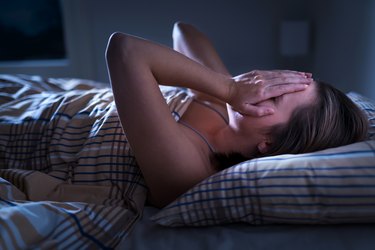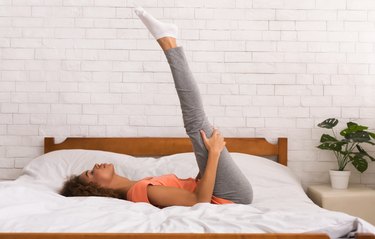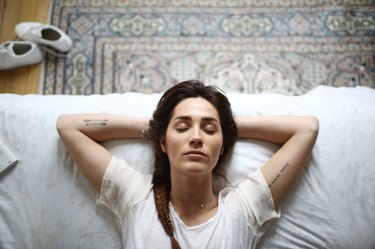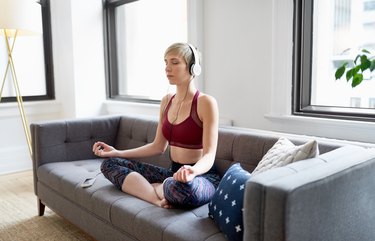
When you were little, you might've been afraid to drift off to dreamland, worried about a monster under your bed. As adults, most of us outgrow this nighttime fear.
But for people with somniphobia, falling sleep still triggers terror. Sometimes referred to as "sleep dread," somniphobia is a specific type of anxiety or fear related to sleep that typically increases as bedtime approaches, says sleep expert Wendy Troxel, PhD, a senior behavioral and social scientist at the RAND Corporation and author of Sharing the Covers: Every Couple's Guide to Better Sleep.
Video of the Day
Video of the Day
Fear of sleep isn't just an inconvenience — it can also affect your mental and physical health. So, if you're wondering why am I scared to sleep? (and your anxiety is getting in the way of your day-to-day functioning), read on to learn about the signs of somniphobia and effective ways to cope with this condition.
What Is Somniphobia?
Somniphobia is just that: a phobia.
A phobia is defined as an extreme, irrational fear of something that presents little or no actual danger, according to the National Institute of Mental Health (NIMH).
Approximately 12.5 percent of American adults wrestle with a specific phobia during their lifetimes, per the NIMH.
In the case of somniphobia, sleep — something our bodies need to function properly — is the thing that brings up severe anxiety.
Like other types of phobias, somniphobia can be very stressful and lead to serious consequences, most notably sleep deprivation, Troxel says.
Indeed, chronic sleep loss is linked to an increased risk of heart disease, kidney disease, high blood pressure, diabetes, stroke, obesity, depression and other cognitive issues, according to the National Heart, Lung, and Blood Institute.
Symptoms of Somniphobia
Signs of somniphobia resemble the common symptoms of anxiety or panic, Troxel says. The main difference is timing: Somniphobia symptoms specifically occur close to bedtime, while trying to fall asleep or in the middle of the night, she explains.
Symptoms may include:
- Feeling stressed, overwhelmed, nervous, agitated, restless and fearful
- Upset stomach
- Rapid heart rate and/or breathing
- Muscle tension
- Shakiness or trembling
- Sweating
- Nocturnal panic (a sudden and intense burst of extreme fear or anxiety that occurs during sleep, causing one to wake up in a startled, often terrified state)
Causes
Experts don't really know what causes somniphobia (or other phobias, for that matter), Troxel says.
But one thing is for certain: You're more likely to experience somniphobia if you have anxiety or a sleep disorder, or if you have a family history of phobias or other mental health disorders, Troxel says.
For instance, sometimes somniphobia appears to arise in response to a difficulty with sleep. "Most often we see this in individuals who have a sleep disorder, such as insomnia or obstructive sleep apnea, who over time, after not sleeping well, develop anxiety around their ability to sleep soundly at night," Troxel says.
"Somniphobia also commonly occurs among individuals with other mental health disorders, including post-traumatic stress disorder (PTSD)," Troxel says. People dealing with this distressing disorder may develop somniphobia (or even avoid sleep altogether) to prevent nightmares, a cardinal symptom of PTSD, she explains.
Many people with somniphobia will also actively avoid sleep by using excessive alcohol or caffeine, Troxel says.
"Unfortunately, these avoidance strategies only make the situation worse as one becomes more sleep-deprived," Troxel adds.
Related Reading
3 Ways to Manage Somniphobia
If you're battling fear at bedtime and it's affecting your quality of life, try these strategies to help you cope with the condition and hit the hay for good health.
1. Get Professional Help
"Treatment [for somniphobia] really depends on the underlying cause of the symptoms," Troxel says. "Therefore, the first step is to talk with a sleep or mental health professional to determine if another sleep disorder or mental health disorder is driving the symptoms."
The good news: Effective treatments exist, no matter the reason for your fear of sleep.
For example, cognitive behavioral therapy (CBT) can be very useful for those with insomnia-induced somniphobia. CBT "involves a set of behavioral 'prescriptions' to regularize sleep habits and work through unhelpful thoughts or fears about sleep," Troxel says.
"And for those who have nightmares, imagery rehearsal therapy (IRT) is a behavioral treatment proven to be effective in reducing nightmare frequency and intensity," Troxel says.
IRT entails "practicing" (via imagery) a more pleasant dream experience during the daytime to help shift your mindset and "break the habit" of having disturbing dreams at night, she explains.
2. Try Relaxation Techniques
"Finding ways to unwind and reduce anxiety at night, such as mediation, yoga or deep breathing exercises, can also be helpful," Troxel says.
Specifically, meditation is an amazing method to mellow out before bed. Case in point: An April 2015 study in JAMA Internal Medicine found that practicing mindfulness meditation reduced insomnia, fatigue, depression, anxiety and stress among adults with chronic sleep problems.
New to meditation? Sleep apps — which offer everything from guided sleep meditations to soothing nature sounds and calming music — are a great place to start for sound slumber.
3. Practice Good Sleep Hygiene
Healthy sleep behaviors like setting consistent bedtimes and wake times, and limiting bright screen use before bed are also critical for catching quality zzzs, Troxel says.
Similarly, steer clear of alcohol or caffeine at night, which can disrupt and sabotage your shut-eye, she adds.
Was this article helpful?
150 Characters Max
0/150
Thank you for sharing!
Thank you for your feedback!
Is this an emergency? If you are experiencing serious medical symptoms, please see the National Library of Medicine’s list of signs you need emergency medical attention or call 911.


